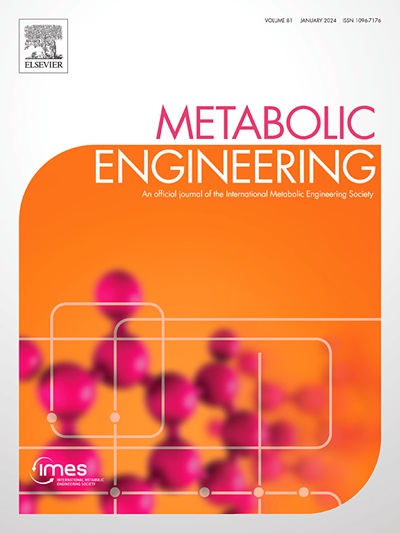Hybrid biological-chemical strategy for converting polyethylene into a recyclable plastic monomer using engineered Corynebacterium glutamicum
IF 6.8
1区 生物学
Q1 BIOTECHNOLOGY & APPLIED MICROBIOLOGY
引用次数: 0
Abstract
Converting polyethylene (PE) into valuable materials, particularly ones that are better for the environment than the incumbent plastics, not only helps mitigate environmental issues caused by plastic waste but also alleviates the long-standing problem of microbial fermentation competing with food supplies. However, the inherent robustness of PE due to its strong carbon-carbon bonds and high molecular weight necessitates harsh decomposition conditions, resulting in diverse decomposition outcomes that present significant challenges for downstream applications, especially for bioconversion. In this study, we demonstrate a hybrid biological-chemical conversion process for PE, converting its decomposition products, namely short-chain diacids, into a monomer, β-keto-δ-lactone (BKDL), for highly recyclable polydiketoenimine plastics using engineered Corynebacterium glutamicum. Since BKDL synthesis requires a substantial supply of malonyl-CoA, we employed an alternative biosynthesis pathway that leverages C. glutamicum's natural proficiency in amino acid production. We optimized this pathway in vivo by minimizing carbon loss to CO2 and byproducts, improving the transporter system, and maximizing co-factor regeneration. Furthermore, we co-optimized the PE deconstruction process to produce predominantly C4 to C6 diacids and integrated three catabolic pathways into the engineered strain to enhance diacid utilization, maximizing the carbon conversion from PE. Finally, an engineered polyketide synthase was introduced into C. glutamicum to enable BKDL synthesis. This work demonstrates the potential of a chemo-biological hybrid strategy for recycling plastic waste, highlighting its promise in addressing environmental challenges and promoting sustainable materials.
利用工程谷氨酸棒状杆菌将聚乙烯转化为可回收塑料单体的混合生化策略。
将聚乙烯(PE)转化为有价值的材料,特别是那些比现有塑料更环保的材料,不仅有助于缓解塑料废物造成的环境问题,而且还缓解了微生物发酵与食品供应竞争的长期问题。然而,由于其强大的碳-碳键和高分子量,PE的固有稳健性需要苛刻的分解条件,导致分解结果多样化,这给下游应用,特别是生物转化带来了重大挑战。在这项研究中,我们展示了PE的混合生物化学转化过程,将其分解产物,即短链二酸,转化为单体,β-酮-δ-内酯(BKDL),用于高度可回收的聚二酮亚胺塑料。由于BKDL的合成需要大量的丙二酰辅酶a,我们采用了另一种生物合成途径,利用谷氨酰胺天然的氨基酸生产能力。我们通过减少二氧化碳和副产品的碳损失,改善转运系统,最大化辅助因子再生,在体内优化了这一途径。此外,我们共同优化了PE的分解过程,主要生产C4到C6二酸,并将三种分解代谢途径整合到工程菌株中,以提高二酸的利用率,最大限度地提高PE的碳转化率。最后,将一种工程化的聚酮合成酶引入谷氨酰胺,使其合成BKDL。这项工作展示了化学-生物混合策略在回收塑料废物方面的潜力,突出了其在应对环境挑战和促进可持续材料方面的前景。
本文章由计算机程序翻译,如有差异,请以英文原文为准。
求助全文
约1分钟内获得全文
求助全文
来源期刊

Metabolic engineering
工程技术-生物工程与应用微生物
CiteScore
15.60
自引率
6.00%
发文量
140
审稿时长
44 days
期刊介绍:
Metabolic Engineering (MBE) is a journal that focuses on publishing original research papers on the directed modulation of metabolic pathways for metabolite overproduction or the enhancement of cellular properties. It welcomes papers that describe the engineering of native pathways and the synthesis of heterologous pathways to convert microorganisms into microbial cell factories. The journal covers experimental, computational, and modeling approaches for understanding metabolic pathways and manipulating them through genetic, media, or environmental means. Effective exploration of metabolic pathways necessitates the use of molecular biology and biochemistry methods, as well as engineering techniques for modeling and data analysis. MBE serves as a platform for interdisciplinary research in fields such as biochemistry, molecular biology, applied microbiology, cellular physiology, cellular nutrition in health and disease, and biochemical engineering. The journal publishes various types of papers, including original research papers and review papers. It is indexed and abstracted in databases such as Scopus, Embase, EMBiology, Current Contents - Life Sciences and Clinical Medicine, Science Citation Index, PubMed/Medline, CAS and Biotechnology Citation Index.
 求助内容:
求助内容: 应助结果提醒方式:
应助结果提醒方式:


